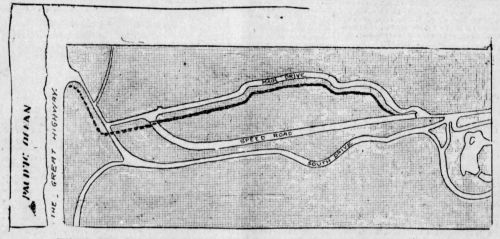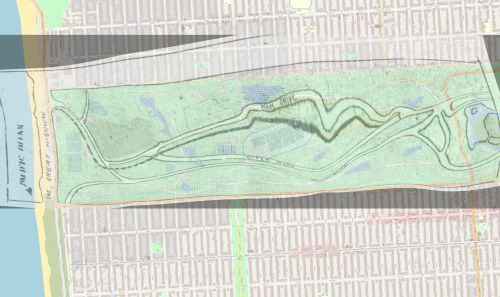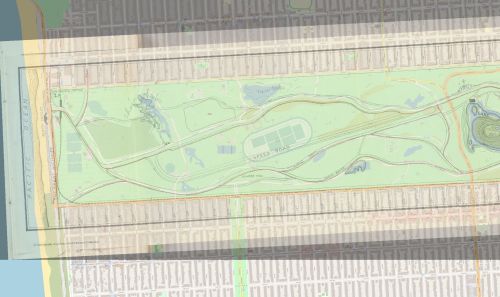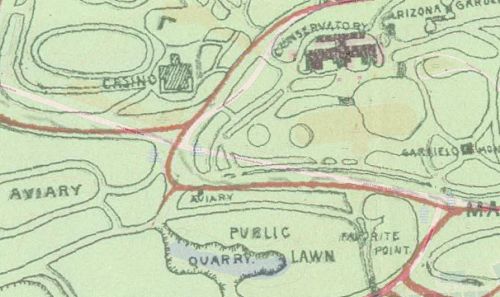WHAT THE BICYCLISTS WOULD LIKE TO DO IN THE PARK. - The San Francisco Examiner, 11 Sep 1894
See the preceding day's article, RIGHTS OF THE HORSE AND THE BICYCLE ON PARK ROADS. - The San Francisco Examiner, 10 Sep 1894, which this article references. Right now there is an attempt to restore cars to the sections of Golden Gate Park that are currently car-free, due to the pandemic. Some of the same agitations between classes and castes, between four wheels and two are evident in these two 1894 articles as are evident now, in 2021.
WHAT THE BICYCLISTS WOULD LIKE TO DO IN THE PARK.
They Want to Hear the Music Play and a Good Road to the Beach.
But Above All They Demand the privilege of Wheeling Around Stow Lake.
WHAT MAY BE GIVEN THEM.
An Exclusive Bicycle Road From the East End of the Speed Track to the Beach - No Hope of Avoiding the Hilly Road Behind the Conservatory - The Main Drive Leading to the Music Concourse Sacred to the uses of Horsemen - Bicycle Versus Carriage.
Yesterday afforded a splendid opportunity for the study of the merits of the controversy between the bicycles and horsemen who use the roads of Golden Gate Park. It was a holiday and the sun was shining pleasantly enough to coax into the open air every lover of the horse as well as those who ride the silent wheel. There was no music in the Park, so the bicyclists were at liberty to wheel wherever their fancy led them, even into the music concourse and over the main drive leading to the concourse.
There were hundreds of carriages and mounted riders speeding along the roads. There were also hundreds of men and women bicyclists.

Bicycling in Golden Gate Park
Collection:
Roy D. Graves Pictorial Collection SERIES 1: SAN FRANCISCO VIEWS. Subseries 4: San Francisco Cityscapes. Volume 10: San Francisco --Views
Contributing Institution:
UC Berkeley, Bancroft Library
Just one accident was recorded, and that happened to a horseman who ordinarily takes his airing behind a three-minute animal, but who on this occasion was enjoying himself on a bicycle.
This gentleman was George S. Fife, manager of the Luning estate, who lives at 1201 California street. Nobody who knows Mr. Fife's love for a fast horse will assert that he is prejudiced against those who drive in the Park, and yet he asserted yesterday that if horse drivers treat bicyclists generally in the manner he experienced, the charge of rude conduct in the Park should not be allowed to lie at the door of the bicyclists, where horsemen placed it, but should be transferred to the account of the horsemen themselves.
Mr. Fife was wheeling along the main drive when be heard the clatter of hoofs, and looking back saw a trotter in a light buggy bearing directly down upon him. Thinking that the careless driver had not seen him, Mr. Fife turned his wheel from the right to the left side of the road. The driver, instead of going straight ahead, deliberately swerved his animal after the bicyclist. Fife crossed the road again and the driver promptly followed him. The bicyclist then became aware that the horseman was trying to run him down, and says he twisted in every direction in his efforts to avoid an accident. The man in the buggy followed every turn of the man on the bicycle, and at last Fife saw the horse immediately at his side. Before the wheels of the buggy could crush him Fife gave his bicycle one more turn. This saved him. The buggy wheel just grazed the frail spokes of the bicycle. Fife was thrown from his machine and rolled over the ground. The man in the buggy gave whip to his horse, and was lost to sight before his victim could secure a good look at him. The spokes of the bicycle were twisted and broken. Mr. Fife found it necessary to carry his wheel to a repair shop on Stanyan street.
A recital by Mr. Fife of his experience aroused the indignation of a number of bicyclists who listened, and nearly all of them told of adventures in the Park which, while not quite as bad as that of Mr. Fife, nevertheless placed the lovers of the horse in a rather unenviable light. None but Mr. Fife had anything to say about willful attempts to annoy bicyclists, but the record of accidents caused by recklessness and lack of consideration for the rights of the wheelmen was voluminous.
From the stories told by the wheelmen it appeared that people in carriages seem to think that the roads in the Park belong to them exclusively. They act as though neither people on wheels nor people on foot had a shadow of right to use any part of the main drives. They hold the lives and bones of bicyclists as of small concern. Eternal vigilance is the price the wheel men must pay for the privilege of taking their breathers in the Park. Under such conditions the bicyclists stated that they could find very little amusement in the Park, and yet having no other place to go they are compelled to take chances or leave their wheels at home.
The plan of the Park Commissioners is to set aside certain roads for the exclusive use of bicyclists and to make new roads for them to glide over. All this will take money, which the Commissioners find hard to get just now.
The unemployed laborers who were given work in the Park last winter completed a portion of a roadway that is intended for the exclusive use of wheelmen, but there is no money to extend it to the end, so the Commissioners must wait for a windfall before going ahead with this plan.
The portion of the road so far completed extends from the main drive at the point where it joins the eastern end of the speed track and parallels the main drive to a point between the water tank and the west end of the speed track. It is the intention of the Commissioners to eventually carry the road out to the beach. From the east end of the speed track the bicyclists will then have the exclusive use of a road to the ocean, and Superintendent McLaren says that this road will be without grades and in every respect as good a piece of road as any in the Park.
In order to reach this stretch of road however, the wheelmen will find it necessary to use the main drive with its hundreds of carriages, and they will as usual find themselves barred off that portion of the drive between the Superintendent's house and the Casino. Refused permission to use this piece of road the bicyclists will in the future as at present be compelled to toil their wheels over the steep grades of the road behind the conservatory. As this is one of the chief causes of complaint the wheelmen fail to see where they will be greatly benefited by the making of the extensive wheelmen's road now in contemplation. Unless some arrangement is made whereby they can have a smooth, even run to the Park entrance or to the beach they will consider themselves aggrieved.
As to the complaint of the bicyclists that one of the most charming bits of the Park is lost to them because they are debarred from wheeling around Stow lake, Superintendent McLaren says that this is a hardship that can only be done away with at a cost of $68,000, and the Commissioners do not know where the money is coming from.
The money is needed, McLaren says, to widen the road way on the embankment so as to provide an exclusive road for the bicyclists. At present it is utterly impossible to permit both bicycles and carriages to use the road around the lake, and preference is given to carriages for these reasons which the Superintendent gives:
"There are a great many elderly ladies and gentlemen, as well as cripples and people in ill-health, who are driven out to the Park every warm day, and who would find it utterly impossible to climb the grade leading to the lake. They would miss the beauty of the spot by never visiting it if they were compelled to go there on foot. They can go in no other way than by using carriages and they are certainly entitled to as much consideration as any other class of people. A place has been provided at the lake where bicyclists may leave their wheels while they walk around the lake if they so desire. They are for the most part athletic young men and women and should not object to walking a little when they consider that the commissioners have not the money to provide a special road way for them. A sensible being might think that the wheelmen would be glad to be given a place to put their wheels and a chance to rest themselves after a long ride by taking a walk around the lake.
"There is no denying the fact that extra provision should be made for the pleasure of bicyclists, for their numbers are becoming appreciably greater every day. If they continue to increase in numbers as they have during the past few months it will not be long before they will outnumber the people who come in carriages. If you sit at one of the windows of the lodge you may count them by the hundreds on every bright day, and I would not be surprised to learn that as many as 8,000 wheel men visited us on Sundays.
"It is only natural that bicyclists as well as others should want to listen to the music when the band is playing, but the wheelmen themselves recognize the impracticability of permitting them to enter the concourse when it is filled with carriages. At such times it is only a daredevil who would want to enter the concourse, where his presence would be likely to cause a panic among the horses and place the lives of a great number of people in danger. Many bicyclists have told me that it would not do to allow them in the concourse on music days under the present arrangement, but they think other provisions should be made that will enable them to enjoy the music. If the music stand is moved over into Concert Valley, where the Midwinter Fair buildings now stand, it will doubtless be feasible to provide for the pleasure of the bicyclists in this direction, but at present it seems impossible.
"I fail to see how their demand to be permitted to use that stretch of the main drive contiguous to the music concourse could be complied with. Every visitor to the Park knows that nine-tenths of the carriages that enter the Park turn into the concourse when the band is playing a selection, and when it is over drive out again and continue on to the beach. The same thing is done by the drivers while returning from the beach. This makes a continuous stream of vehicles moving in and out of the concourse and very often there are so many that they become badly jammed. Imagine what might happen if people on bicycles were permitted to use that stretch of ground on the main drive. All sensible people admit that if a single horse became badly frightened at such a time and started to even rear and plunge, some terrible accidents would surely occur. Considering this the Commissioners have closed a portion of the drive to the wheelmen on music days. It is unfortunate that no other way is left for them to reach the beach than by the road back of the conservatory, but it is impossible to better the condition at present.
"To prove that the Commissioners are alive to the rights of the bicyclists and the necessity for providing privileges for this large class of the Park's patrons I will refer you to that portion of the Commissioners' report for 1893 that refers to the bicyclists."
The portion of the report mentioned by Superintendent McLaren is as follows:
We think that portion of the Park lying to the west of Twenty-fourth avenue should be devoted to a forest, less so much of it as is and may be judiciously appropriated to drives and walks. In time the old or north drive should be widened to a uniform width of at least sixty feet. Neighboring to it a broad walk should be extended to the ocean and equipped with benches and drinking fountains at convenient intervals. There should also be constructed contiguous to this drive a bicycle run extending to the beach, which should be for the exclusive use of the bicyclers. The use of the bicycle has been steadily on the increase of late years, and is said to be a most healthful exercise. It must have a recognized place in the Park, and it is essential that its privileges should be separated from the walks and drives. It frightens many horses, thereby rendering it unsafe for the wheelmen and those in the vehicles. The bicyclers should not be permitted to run over any and all the drives indiscriminately, and we apprehend that the patrons of the wheel will cheerfully conform to Park regulations when suitable runs are provided and allotted to them.
W. E. Lee is an enthusiastic champion of the rights of bicyclists. Referring to the criticisms passed by the horsemen in the printed interviews yesterday he said:
"The charge that wheelmen find pleasure in frightening horses in the Park and causing accidents is very nonsensical. Wheelmen are more careful than horsemen about those things, because they know that if they run into carriages with their light machines they are going to get the worst of it. Collisions of this sort cost the wheelmen their valuable wheels besides endangering their lives and limbs. We are accused of flying like the wind through the Park. It is true we go a little fast, but then you can show me very few horsemen who obey the ten-mile-an-hour law. Generally they go at a three-minute clip. Bicyclists should be allowed to run faster than drivers, because they have more control over their wheels than a man can possibly have over a horse.
"We don't want to go into the music concourse on music days, because we recognize the danger of accidents occurring, but we do want to go around Stow lake. The lake is the prettiest place in the Park, and while they are providing ways for others to enjoy it we bicyclists cannot see why we should not be accorded the same privilege.
"The accusation that novices on the bicycle are allowed to wobble around the Park is silly. Once in a while I suppose a novice manages to get in, but 99 per cent of the Park wheelmen are skillful riders. Accidents do not occur as often as people think. When a wheelman meets with an accident in the Park he does not carry his broken wheel down town, but he takes it to one of the repair shops near the Park.
"They don't get more than three or four wheels a month to repair as the result of accidents.
"I wonder what Mr. Potter means by saying that all the mischief in the Park is caused by three-minute bicycle riders, and in the next paragraph making the statement that the novices alone are to blame? Novices do not ride a three minute clip. Mr. McCord refers to the way some of these hoodlums ride. It is pretty hard to call bicycle riders hoodlums. Hoodlums do not usually take their amusement in the form of bicycle riding. They generally hire a cheap livery rig and amuse themselves by riding furiously after every bicycle rider they catch outside the view of the police.
"By the way, speaking of policemen, why not put a few of the Park policemen on bicycles? They could keep an eye on the few mischief-makers that appear at infrequent intervals and make it so warm for them that they would soon relieve the Park of their presence."
To the Editor of the Examiner - Sir: It is all very well for the bicycle riders to fall back on their constitutional right and claim the benefit of a Supreme Court decision, which they say gives them the privilege of going anywhere any vehicle can go, but it would be very foolish for those interested in bicycling to attempt to enforce such a right in Golden Gate Park, if any right exists.
At present the speed limit for teams in Golden Gate Park is ten miles an hour. When the Park is comparatively empty that limit is frequently exceeded. The Park police are an intelligent body of men and they don't make arrests unnecessarily, but only enforce the rule when it is absolutely necessary. At present there is practically no speed limit for bicycles in the Park. A man may ride as fast as he can, provided, of course, that he does not behave badly. Now, if the bicyclists insist on removing the restrictions against admission to the music concourse and from riding on the two reserved roads on Sunday, the horsemen are very likely to have something to say. They will probably demand of the Park Commissioners that the speed of bicyclists be limited to ten miles an hour, the same as teams. They will also ask the Park Commissioners to prohibit coasting down hills, as is the law in New York and Washington, despite the constitutional right of a bicyclist to go as fast as he can. At the intelligent, courteous bicycle rider, who knows the rules of the road and is mindful of the rights of others, no legislation need be directed: but there is the same proportion of hoodlums on one wheel as there is on two wheels or four wheels, and Park restrictions being found necessary to curb the exuberance of occasional buggy drivers, they have also been found necessary in the case of the bicyclist. It is true that no man should be permitted to drive upon the highway a horse that he cannot control under almost any circumstances; but to demand that every horse driver shall be forced to train his horse to stand still while a fire is lit under him or refrain from shying when a bicyclist runs silently and unexpectedly under his nose is asking a little too much. A gentleman on a bicycle will have as much respect for the rights and feelings of a driver as the driver will have for the rights and feelings of pedestrians; but, unfortunately, all who ride wheels are not gentlemen, and the large number of accidents that have occurred in Golden Gate Park are more than sufficient justification for the restrictions placed upon bicycle riders, constitutional rights to the contrary notwithstanding. The large number of women and children who ride horseback and drive in the Park would be a sufficient excuse for restrictive rules, it any were needed.
The situation is very much like that which existed at a race once at Santa Cruz. It was a race for young horses, and Tim Kennedy - a famous driver of those days - being very anxious to win, hit upon a scheme to scare every horse that was behind him. He wore a long, white linen duster, and arranged it so that the tails flapped behind over the sulky sent, and if a young horse would be driven close up to him it would be badly scared. After the first heat a complaint was lodged against Mr. Kennedy, who was called into the judges' stand. Kennedy stoutly maintained that there was no rule against a trotting horse driver wearing a linen duster and wearing it unbuttoned.
"You might sit on the skirts, Tim," said old Simpson, who was one of the judges.
"I might," replied Tim, “but there ain't no law to sit on my coat tails when I am driving."
"That's so, Tim, there ain't no law," said Mr. Simpson, "but it seems mighty disobliging of you to the other drivers, and it is mighty unhandsome to Pat Farrell there, whose colt got frightened and jumped over the fence and scratched his leg."
"Can't help it," says Tim. "May be it was unhandsome to Pat Farrell, but the rules don't say nothing about acting unhandsome."
"Well, we will put it down to conduct unbecoming a gentleman,'" replied Mr. Simpson, "and call it acting in a rough and boisterous manner, and you will either button up your duster or get off the track."
If the bicycle-riders insist upon absolute freedom to do as they please in the park, claiming it is a constitutional right, the park police may have to be very strict in enforcing the rule against "conduct unbecoming a gentleman." J. B. JONES. San Francisco, September 10th.



